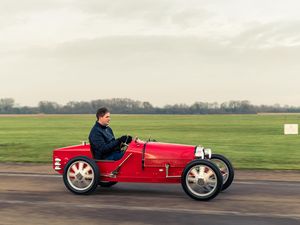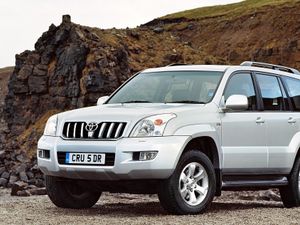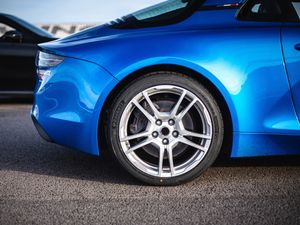Putting the Bugatti Baby II through its paces
Can a small-scale Bugatti bring the thrills of the standard car? Ted Welford finds out

How much would you spend on your children and grandchildren at Christmas? Fifty pounds if they’ve been well-behaved this year, maybe?
A German grandfather decided to really push the boat out however and ordered each of his five grandchildren a Bugatti Baby II you see here – costing as much as £50,000 per car. Scary, right? Those kids must’ve impeccably behaved through 2020.

But what about this present-to-end-all-presents, the Bugatti Baby II? It’s essentially a miniature version of the firm’s Type 35, which was the quickest car of its day in the 1920s, and is exceptionally valuable today. One sold at auction for $3.3m (£2.5m) in 2017, as an example.
But the original ‘Baby’ arguably has a better story. Designed as a one-off toy car for the founder of Bugatti’s eldest child’s fourth birthday, the sports car firm’s discerning customers quickly spotted the model on display while visiting its factory in Molsheim, France, and wanted one of their own.
Five hundred would be produced between 1927 and 1936, and the ‘Baby’ would be reborn in 2019 at the Geneva Motor Show as a slightly oddball way for Bugatti to celebrate its 110th birthday.
A little over 18 months later and here we are with the new car in front of us on a freezing cold December afternoon in Bicester, Oxfordshire, with the Little Car Company – the eccentric firm that’s tasked with creating these miniature cars.
The Baby II’s size is something that’s really hard to gauge in pictures– largely, in part, to its realism to the real thing, and at a 75 per cent scale, it’s not as small as you might expect.
In fact, we’re not really allowed to describe it as a ‘toy’, due to its power and the fact it’s said to be designed for 14-year-olds and over. Though we hazard a guess plenty of grandchildren less than that will be taking a seat behind the wheel…
And today it’s my turn to see what it’s like from behind the less-than-full-size steering wheel. But if you think driving this Bugatti resembles an off-the-shelf electric children’s toy, you’re sorely mistaken. In fact, it’s been engineered with Andy Wallace, Bugatti’s chief test driver for its latest hypercars, while those that have held development roles at some of the UK’s most prominent car makers have been involved in the project.

Based on a 3D scan of a real Type 35 and with replica dials of the original, and utilising parts companies that supply components for the latest 1,500bhp Bugattis, it’s an impressive feat of engineering.
Behind the wheel, you immediately notice the offset camber on the front wheels – just like the original – while the steering offers a really surprising amount of feel. When you turn the wheel, not only can you see exactly why they’re going but it really does have a surprising amount of agility for you to throw it into bends. While I’ve never been lucky enough to drive an original Type 35 – nor do I ever expect to be – you can imagine that the owner of the real deal would be impressed by the similarities.

The powertrain won’t be quite so similar, as here you won’t be coughing on petrol fumes, but rather have a zippy little electric powertrain to play with. In standard form, it offers a modest 4kW (5bhp), but in high-spec Vitesse and Pur Sang – nameplates used on ‘real’ Bugattis – the power is increased to 10kW (13bhp), while also having a larger battery that allows for 31 miles of range.
And the question you’re probably wondering – how fast does it go?
Well, while like the original, the awkward seating position means you can’t really see the speedo – on paper you can do 42mph, but believe me, it feels quicker like that. That higher speed is unlocked by a ‘Speed Key’ – an exceptionally cool nod to modern Bugatti Veyrons and Chirons, which come with an additional key that unlocks the full performance. Here the difference in speed and acceleration between the normal and speed key is immediately recognisable.
It’s safe to say that there are few more enjoyable ways of going around on four wheels (yes, I know my face in some of these pictures suggests otherwise; I’d been standing in a bitter wind for a few hours when these were taken…) and it truly feels raw and involving. Ben Hadley, CEO of the Little Car Company, tells us he always conducts a ‘smile test’ on anyone new to driving one. Nobody is yet to return from their first lap without a huge grin on their face.
But who on earth is buying these things you’re probably wondering? It transpires that there are still plenty of interested parties, as around nearly all 500 of this new production run have been accounted for. We’re told there are some ‘household names’ that are getting one – whether that includes the Queen, Mariah Carey or Simon Cowell is purely up to your imagination. Plenty will be sharing a garage with real Bugattis, while some are purely going to collectors who will never use them – a sad thought. Another is going to a private jet lounge in Dubai. As you do.
Hadley says: “We want to bring these classics to a new audience that otherwise wouldn’t be able to afford them or have access. But they have to be as authentic as possible.
“What we’re all about is making sure that different generations fall in love with driving – I just love the idea of grandparents teaching their kids to drive in one of these.”

Another interesting point raised is about them being EVs. Not least with the recent announcement that new petrol and diesel cars can’t be sold after 2030, trying to convince more people that electric cars are the future is even more important – particularly petrolheads that remain convinced that a car without an engine is like an aeroplane without wings.
Hadley adds: “Ultimately we want to prove EVs can be fun. If this were powered by an engine from something like a lawnmower it would just be so much worse.”

So what else does the Little Car Company have in store? Well, it’s currently building its new factory at Bicester Heritage – a cool industrial estate dedicated to everything automotive – and has recently shown off a collaboration with Aston Martin and its iconic DB5, something we get to have a brief prototype drive of around the site. Perhaps unsurprisingly, you get some strange looks. More manufacturer projects are also in the pipeline, we’re told.
It’s a strange thought that with a starting price of €30,000 (£27,500), people will spend more on a Baby II than many of us will ever splash out on an actual car, and prices rise all the way to an eye-watering €58,500 (£53,700) for the flagship aluminium-bodied Pur Sang models.
Perhaps little wonder that plenty is going to be sharing a garage with multi-million-pound supercars and real Type 35s. Chances are the little toy version will be used more often and also be a lot more fun to use in the process…





